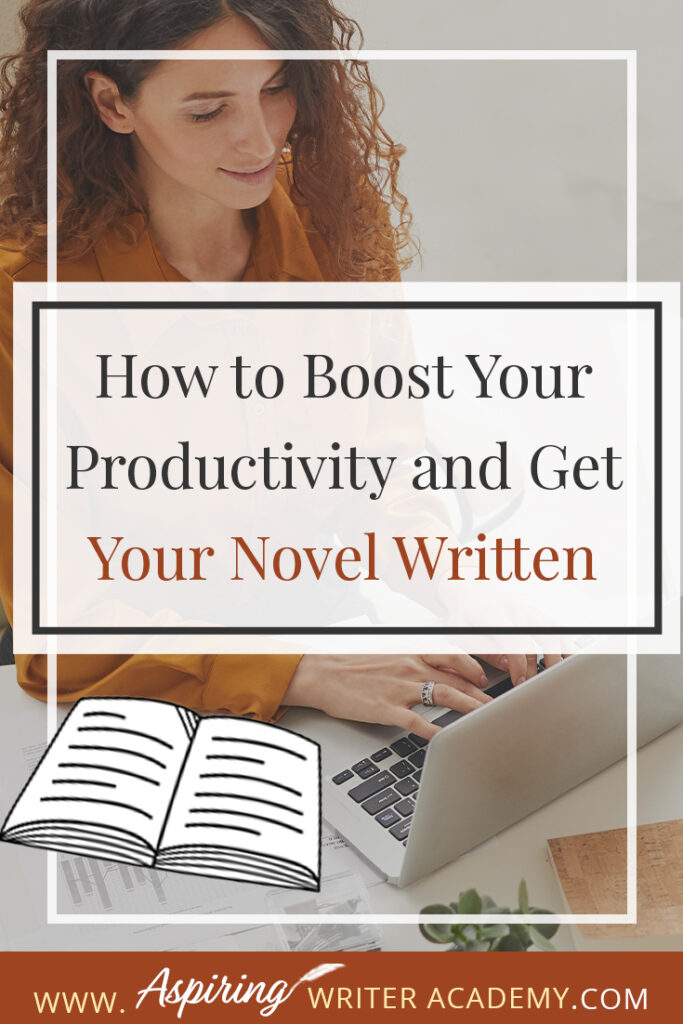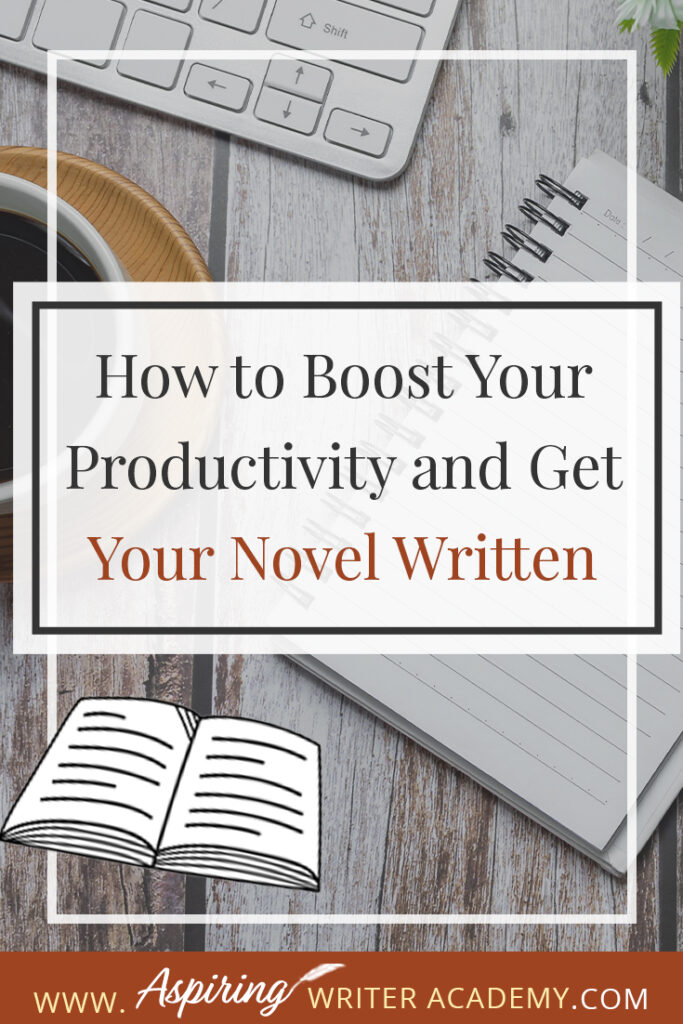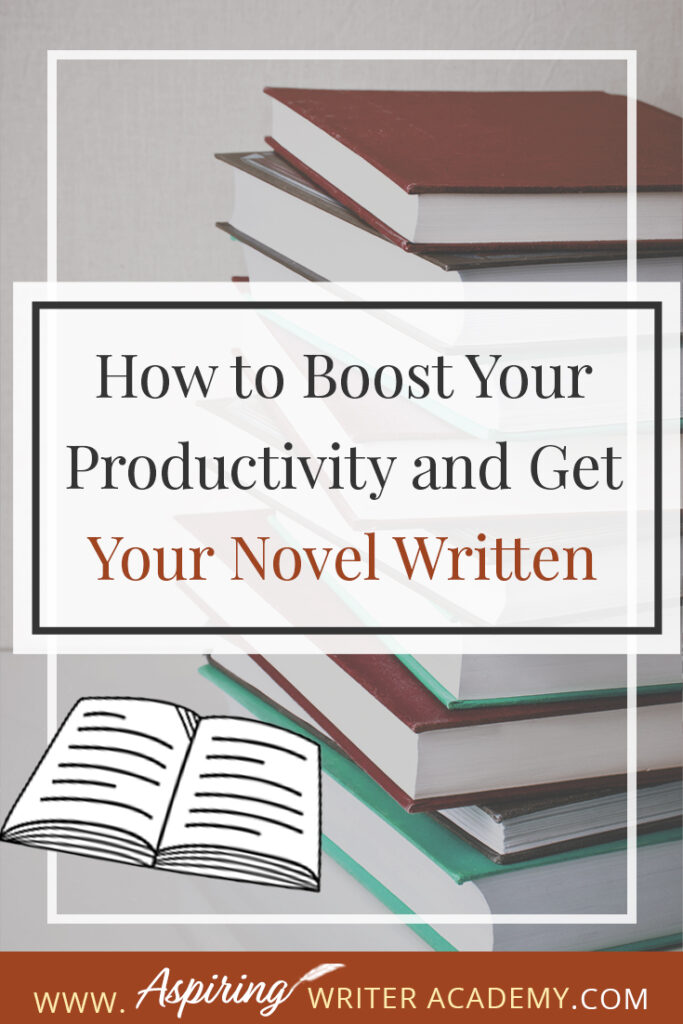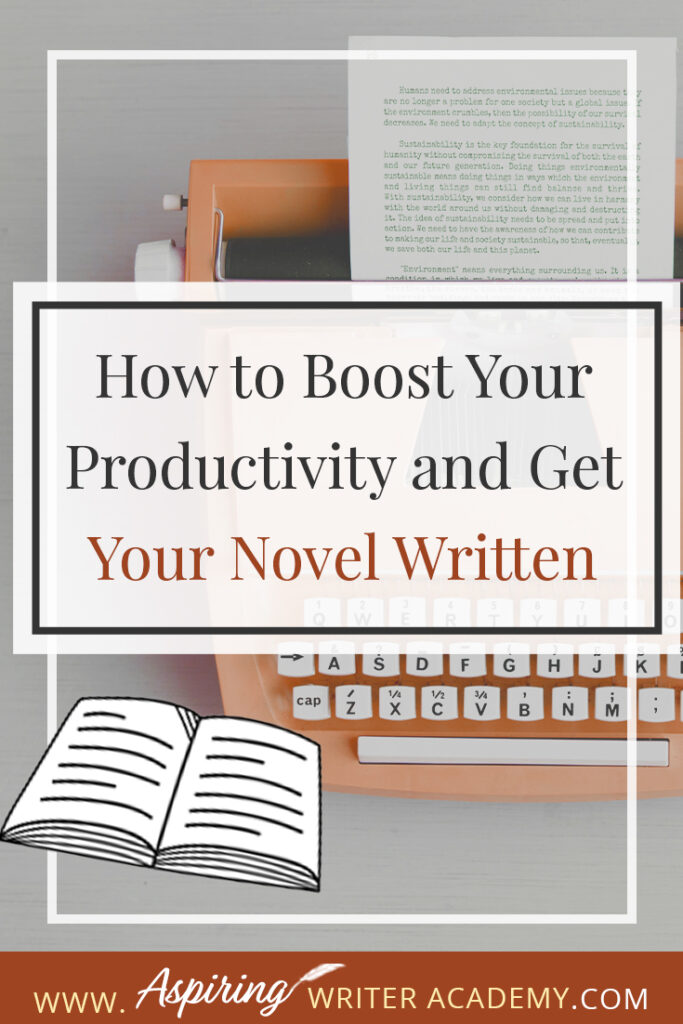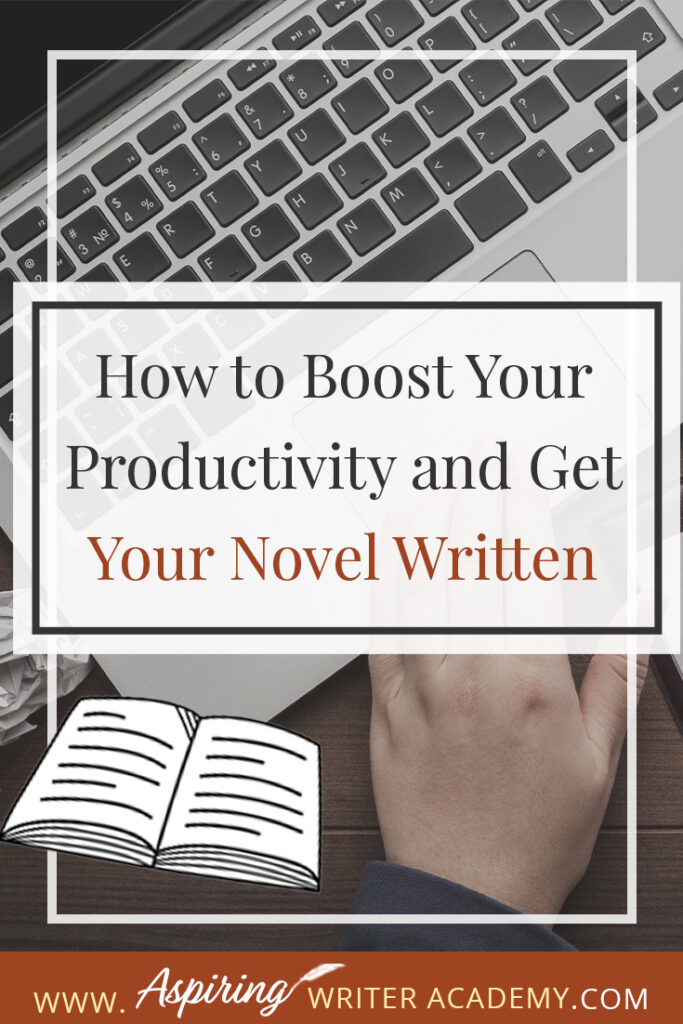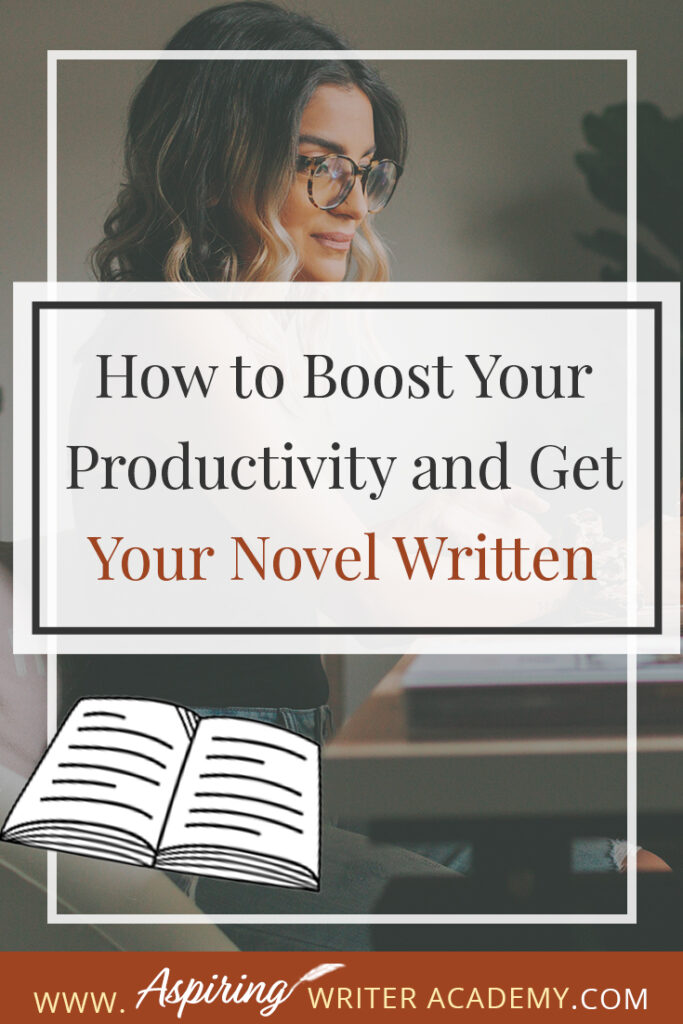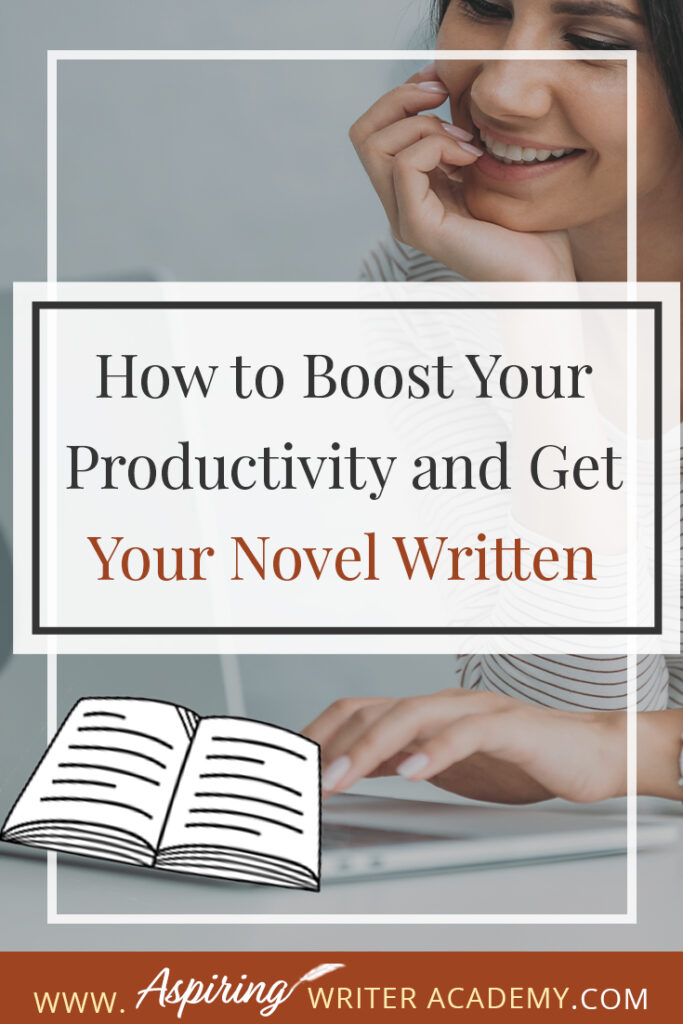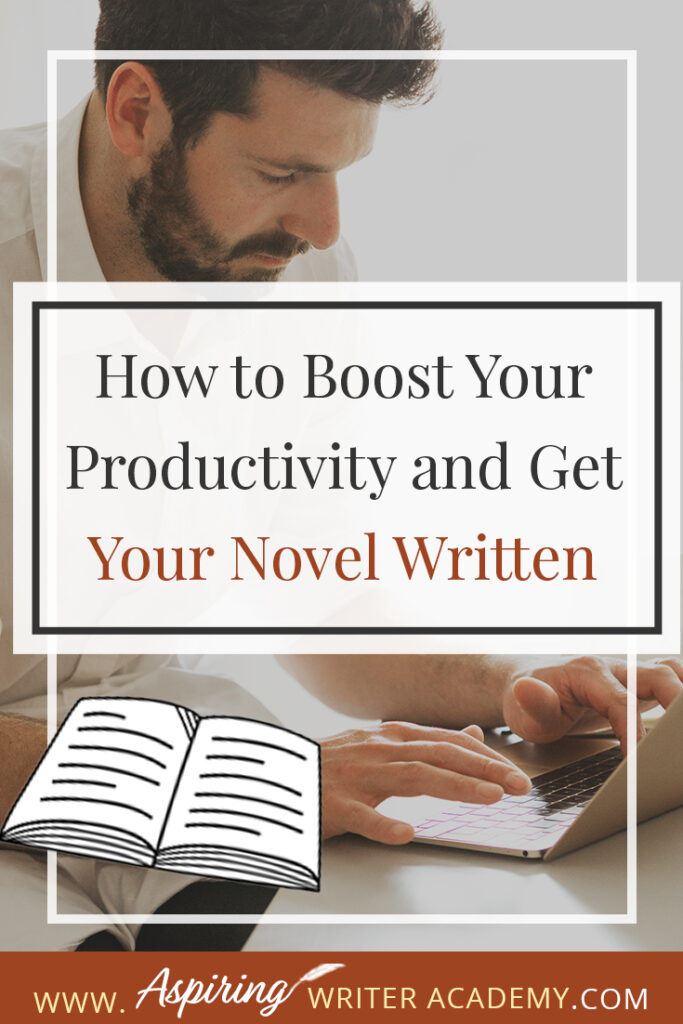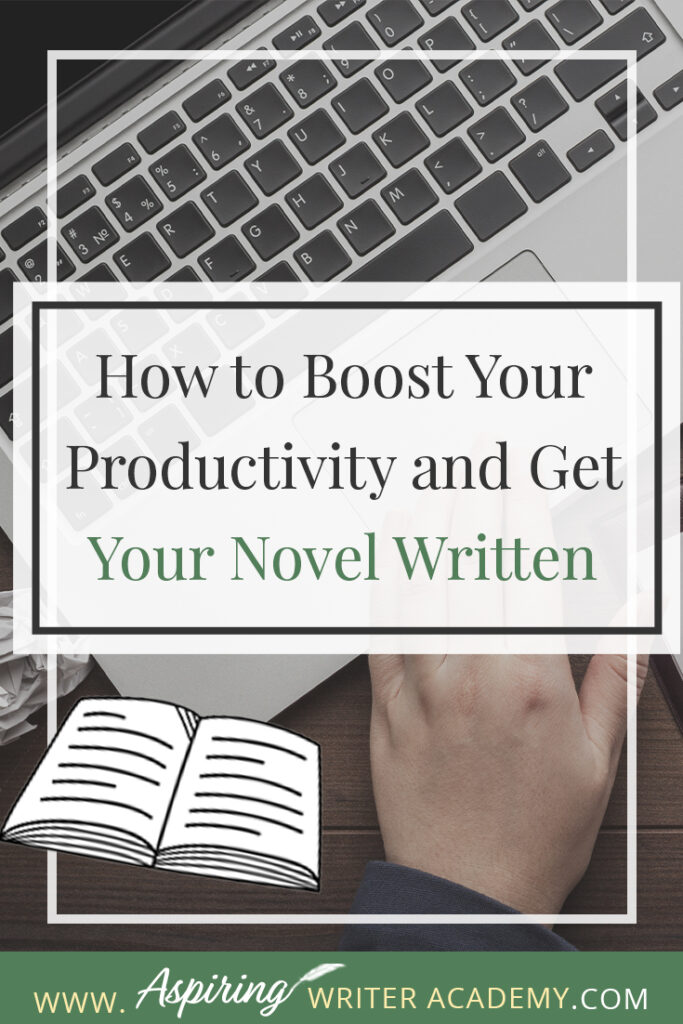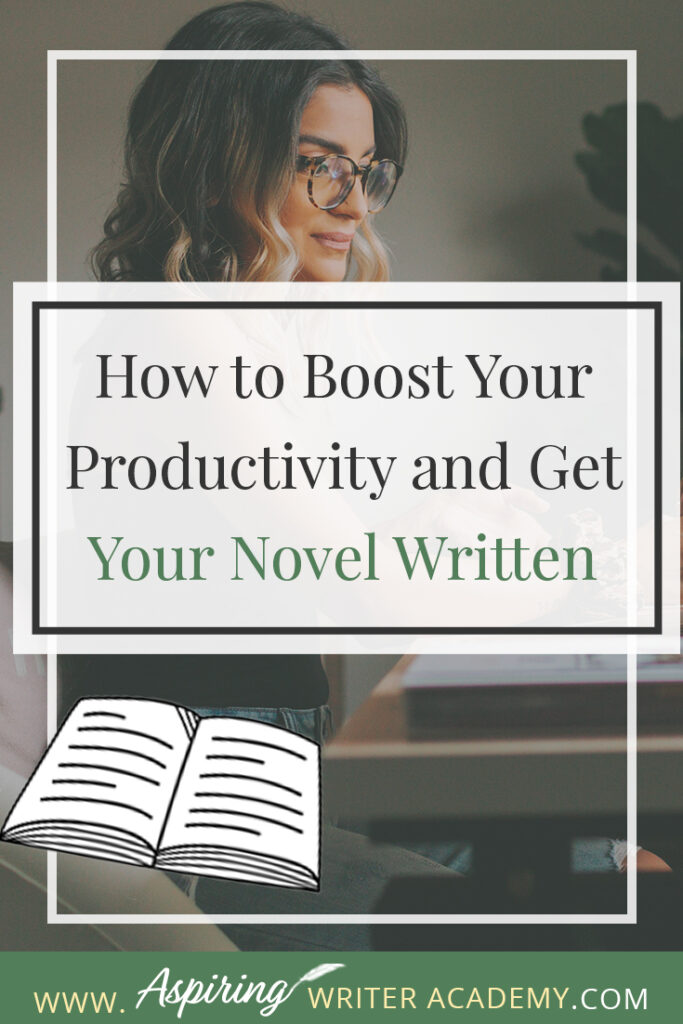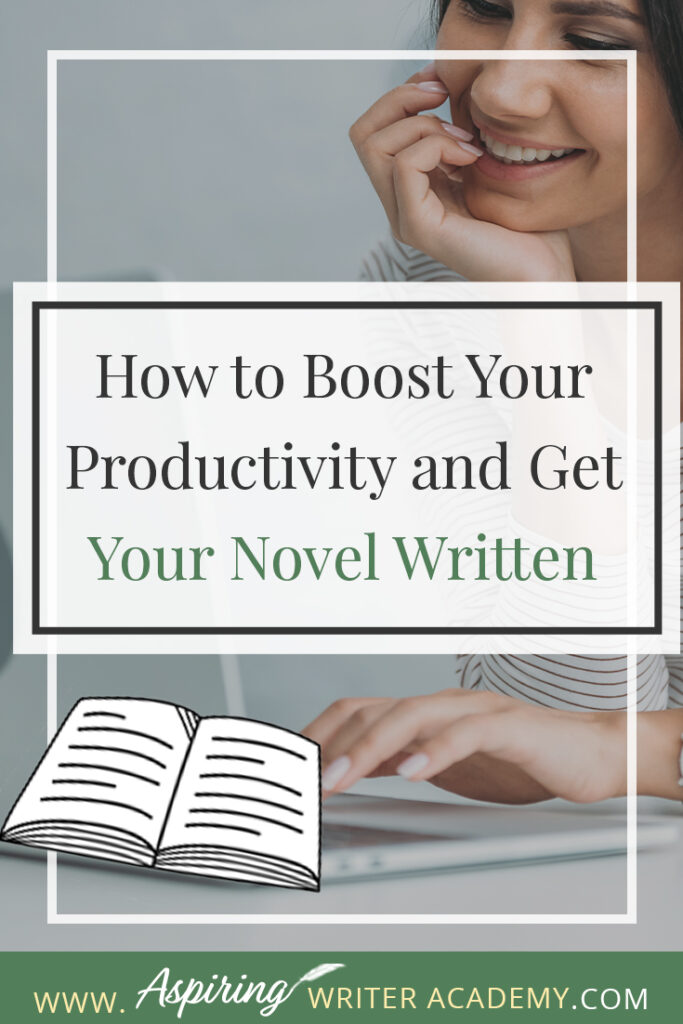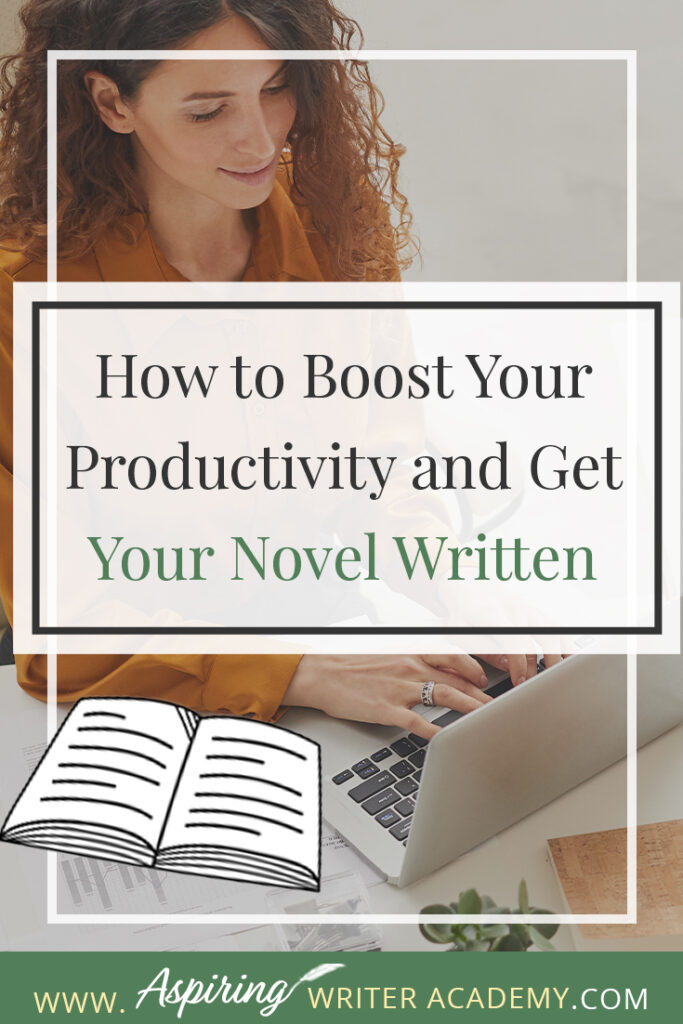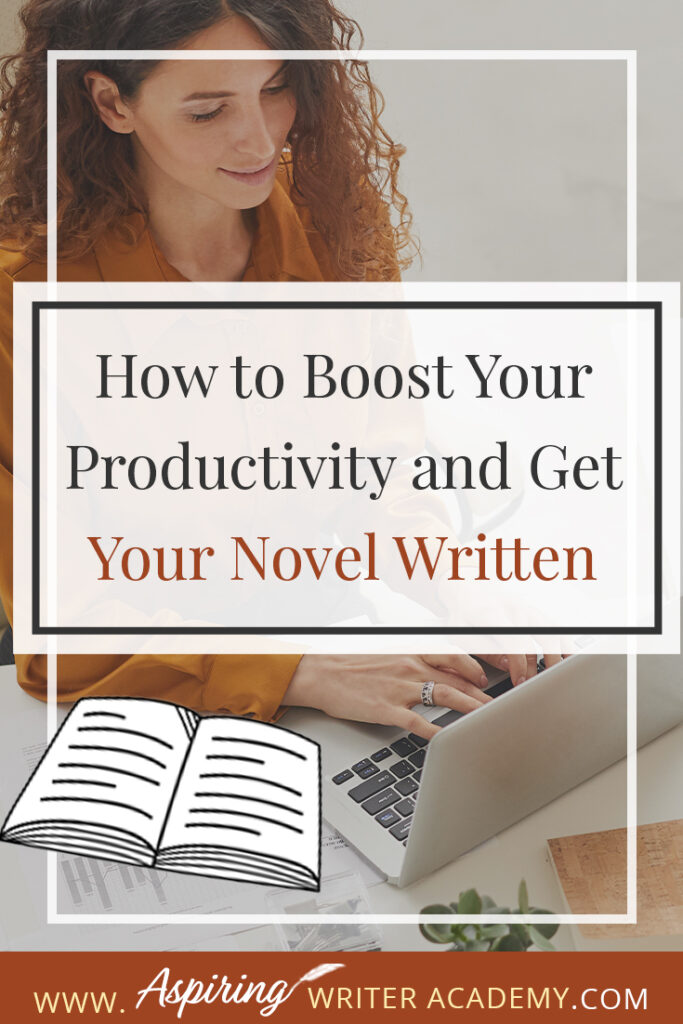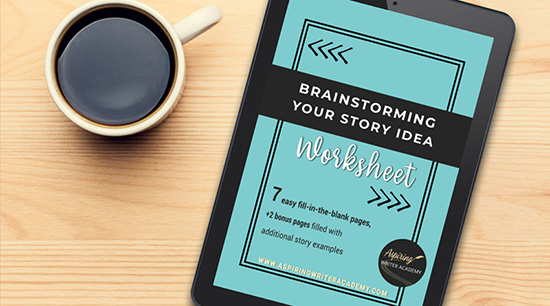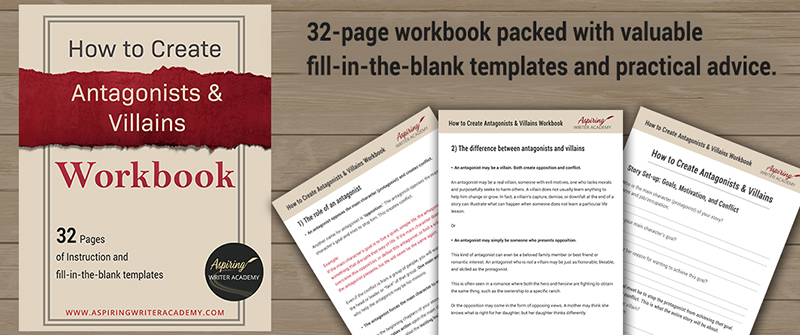How to Boost Your Productivity and Get Your Novel Written

Do you have trouble finding time to write? Or do you wish you could increase your daily wordcount but find personal obligations and the other things on your to-do list keep getting in the way? Do you procrastinate? Do you find yourself eager to get your pages written then get derailed by interruptions?
In our post, How to Boost Your Productivity and Get Your Novel Written, we give you tips and advice to set up the right habits that will allow you to focus, take back your time, and write.
Don’t we all wish we were super-productive authors? Imagine if we could write five full-length novels a year! And still have time for marketing / promotion and book signings! And time to spend with our families! And go on vacation! All without a single ounce of stress!
That would be living the dream, wouldn’t it?
However, for many writers the image that comes to mind when asked what we think we can do does not quite match up with the reality of what we actually can or will do.
When planning to write a fictional novel we often forget about the other obligations and responsibilities on our plate. We do not include enough sick days or needed downtime. Or we think we can get our pages or chapters written faster than it really takes. Then we find ourselves falling behind and possibly missing deadlines. And we feel bad about ourselves for doing so.
How and why does this happen?
Let’s look at 5 Focus Areas:
- How to Cut Personal Distractions
- Mindset: How to Prepare for Success
- Work Ethic: How to Create a Productive yet Sustainable Schedule
- How to Overcome Bad Habits You Didn’t Even Know You Had
- How Your Health Effects Your Productivity and What You Can Do About It
1) How to Cut Personal Distractions:
First, sit down and write a list of every distraction in your life that takes away your writing time. How might you come up with possible solutions to curb these distractions?
Set Boundaries. Think of your writing time as your business hours. Mark on your calendar the days and times each week that you will ‘work.’ Let others know that you will not be available during these time blocks. If you have a home office, put a do-not-disturb sign on your door and add a time frame that lets family members know when you will be finished. Also, discuss these time frames with your loved ones in advance.
If friends ask you to go to lunch or re-arrange your schedule, you must discipline yourself to say, “Sorry, I have an appointment that I cannot miss.” You must make your writing a priority if you want to be a productive writer and finish a novel. If you truly want to move a time block for your writing, look at your calendar and see what day and time that week it can be rescheduled. However, do not make a habit of doing this. Maintaining a schedule keeps productivity and motivation on the upswing.
Turn Off the Electronics. Limit your time on social media sites and checking emails. Look at your calendar and schedule specific times each day (only once or twice) that you will spend online. Also consider limiting the amount of television you watch each day or evening. Instead of binge-watching Netflix series, you could be reading or sketching out the next scene in your fictional novel.
Hold all Calls. Do not answer your phone or return text messages during work hours. Better yet, turn off the sound to your phone or put your phone in a different room. Every time you glance at your phone to see your messages, it interrupts your mental state and scientific studies have shown that it usually takes a person 20 minutes after each interruption to get back into a good workflow. This ruins productivity! If there was a true emergency, you can have someone else come and find you and let you know.
Limit Time with Negative People and Drama Queens.
Sometimes a family emergency will legitimately interrupt your schedule for a specific amount of time. Take care of it and get back to your writing as soon as possible.
However, when a ‘high maintenance’ person continually interrupts with some kind of problem and manipulates you to help, you must ask yourself: Do I want to spend my precious time catering to this person again and again, or write a book that I can publish and be proud of? Is this person’s drama more important than the book sale earnings that I could use to bring in an income to help support my family?
Stop allowing yourself to get caught up in unnecessary drama or waste time listening to other’s complaints. You cannot be productive when your life is full of stress. Which people are the energy boosters and the energy drainers in your life? Limit time with those who sap your energy. Negative people only drag you down and hurt your productivity.
Instead, surround yourself with positive people, fellow writers, or mentors. Each day, recite positive affirmations to keep your motivation high and remind yourself why you want to be a writer and finish writing a fictional novel.
2) Mindset: How to Prepare for Success!
Here’s a hard question which needs an honest answer: Is your schedule or any other outside source sabotaging your writing progress or are you actually sabotaging yourself?
Stop trying to be perfect. Perfectionism does not help get pages written. Just get your story down in rough form, then you can see which areas can be strengthened and which may need to be deleted. This keeps you from wasting time perfecting scenes that may never even make it into the final version of the story.
Do not let past mistakes and failures hold you back. You can’t change the past. All you can do is look forward and take steps right now in the present to change the outcome you desire in the future. Take control of your life! Small changes today can dramatically change your future. Anything that you don’t know, you can learn.
Consider your choices. Think about this for a moment:
- Every decision, no matter how slight, alters the trajectory of your life.
- Every choice has an impact on the compound effect of your life.
Should you take on another commitment, even for a good cause, though it may impact your ability to write your fictional novel?
Should you just kick back and relax tonight, watch that new movie on TV that you really want to see, or push forward and outline the next scene of your novel?
Each choice has consequences. Of course, you need to take care of your health and give yourself some downtime. However, each choice or decision that you make consciously or unconsciously impacts your goals.
Our actions determine our results!
Take responsibility for your choices. Stay solution-oriented no matter what problem or situation arises to try to derail your week. If you mess up one day, how can you make up for it over the next few days of the week to still stay on track?
Use positive affirmations. No negative talk about yourself, your ability, or your writing. If you are weak in a given area, get outside help through classes, books, online groups to improve your craft. YouTube and Pinterest have countless videos and free blogs / tutorials on how to write, publish, and market your work. Each year you have the ability to improve your skills!
3) Work Ethic: How to Create a Productive yet Sustainable Schedule
How do you find balance in your work-life-family schedule? Many authors complain they either cannot find enough time to write, or they are experiencing burn-out from trying to do it all: write, book promo, travel, spend time with family, work outside the home, go to lunch with friends, and volunteer within their community.
One person simply cannot do everything. However, many writers cannot hire a ‘team’ of personnel, like some of the more famous writers, to help handle some of the tasks, either.
Evaluate your calendar and step-back from non-essential responsibilities. Take a good look at your to-do list and see which items you can cut out, perhaps not permanently but for a season or certain amount of time, which will allow you to get your book written. Can you step down from a volunteer position for a few months? Be realistic when considering how much you can handle. Allow for sick days, vacations, and downtime or ‘buffer’ days during which you can catch up, if needed.
Each day, take action on the hardest task first. Many entrepreneurs will tell you to tackle the ‘big rocks,’ the hardest actions first, then do smaller tasks afterward and you will find you can get more done. Do not postpone the hardest tasks but do them first and get them out of the way. Others refer to this advice as ‘Eat the Frog!’ Complete the biggest, ugliest, non-desirable task (your ‘frog’) first, and everything else the rest of the day will seem easier. This keeps you from procrastinating and feeling guilty for not accomplishing that dreaded task. Get it done!
Break large projects into smaller chunk goals. There is the saying, ‘How do you eat an elephant?’ The answer is ‘one small bite at a time.’ The smaller the tasks the easier they will be to accomplish. Writing a book is a huge project, a daunting goal. But by breaking each segment of the novel-writing process into bite-size chunks scene by scene, chapter by chapter, you will finish your fictional novel.
If you can only squeeze in 30 minutes a day for writing, plan out in advance what you will work on so you can make those 30 minutes as productive as they can possibly be.
Limit your daily to-do list and prioritize each item. Giving yourself too many tasks to complete in one day leads you to feel overwhelmed and may encourage procrastination. Only list what you can realistically accomplish each day and put everything else that needs to be done on a SECOND list that you can refer to over time.
Note: This was a game-changer for me. I had a habit of creating overly ambitious to-do lists that stressed me out every time I looked at it. There was no way I could do it all and so I felt bad about my day before it even started. Sometimes I just wanted to watch TV or go on a day trip and forget about doing any of it.
Then I learned to create 2 lists. The daily list that I knew I could accomplish, and the on-going list of everything else that I would eventually like to get done. Now I can see the light at the end of the tunnel when I look at my list of 5 items to do each day. My to-do list looks less intimidating. And when I complete these tasks, I feel a sense of accomplishment and know that I am moving forward to achieve my goals.
Create systems for recurring tasks. This way you are not starting from scratch each time. Make a checklist of everything you will need to do each time you start a new book. Create a checklist of what you need to do for promotion each time you publish a book. Use plot templates and character questionnaires to help you sketch out new story ideas. Set these up once and use them again and again to help you save time the next time.
4) How to Overcome Bad Habits You Didn’t Even Know You Had
While there may be many poor habits that hinder your productivity, here are a few biggies.
First, you must set goals. If you do not have a deadline for writing your novel, your sub-conscious will not take it seriously and your motivation to finish will only be half-hearted. Do you want to be a hobbyist, only writing whenever you feel like it? Or do you want to pursue a writing career and publish books that could potentially bring in an income and create a growing list of raving fans? The choice is yours.
Not only should you set a deadline for finishing the entire novel but also create mini deadlines for completing each phase of the writing process, perhaps creating a deadline for completing each scene or chapter. Plan out what you will accomplish each week.
Focus on one task at a time. Multi-tasking simply does not work. The more you switch back and forth between projects, the less focused you become. Remember it takes 20 minutes for your brain to refocus after each interruption. If you try to read emails and text while spending time with your family, you will not be able to focus on what they may be trying to tell you and lead them to feel unappreciated. If you have 15 different tabs open on your computer and are trying to respond to others online while writing, the quality of your writing will undoubtedly suffer, and it is more likely you will make mistakes.
Stop saying “Yes” to everyone. Carefully consider the pros and cons of accepting an assignment, volunteer position, or committing to anything that could take you away from writing your novel. You may truly want to help others, yet the more you say ‘yes,’ the more those same people will ask for your help in the future. And each ‘yes’ takes you away from your own writing. The people you help will benefit, while your own writing remains unfinished. You may have to work overtime to complete critical tasks which can lead to burn-out and feelings of frustration.
You need to prioritize. If you truly want to achieve your writing goals, you need to stick your writing time at the top of your to-do list each day. Stop focusing on the 80 % of the tasks on your to-do list that do not matter. Do you really need to call your buddy, check emails, wash the dishes, do laundry, get the mail, do your exercise routine, write the bills, clean out the downstairs closet, or go food shopping before you write the next scene of your fictional novel? Can’t those other things wait until after your scene for the day is completed?
Plan in advance what matters most for each day. If you need to go to a doctor’s appointment in the morning and can’t write until the afternoon, make writing your #2 priority when you get back home before doing the other non-essential items on your list. Or if you cannot write that day, plan when you will write. Each day, plan out which items will be your top 3 priorities. It helps to create a daily plan and a weekly plan.
5) How Your Health Effects Your Productivity and What You Can Do About It
Avoid sugary, greasy, unhealthy food and drinks. While you may crave these types of food and drinks in the moment, afterward your body will grow lethargic, and you may experience ‘foggy’ brain making it difficult to focus on writing your novel. Over time, these types of food have a negative effect on your overall well-being, which can also hinder your ability to meet deadlines. To keep your brain in optimal creative working-order, eat healthy and improve your focus, motivation, brainstorming ability, problem-solving skills, and productivity.
Exercise. Make sure you get your body up and moving, which gets your blood pumping, which in turn, sends a healthy amount of oxygen to your brain to give you sharper focus. If you sit at the computer all day, make sure you get up and take regular breaks. Otherwise, if you become sluggish, your writing may become sluggish, and you will have a hard time brainstorming and creating dynamic scenes.
If you find yourself stuck on a scene in your novel, get up and go for a quick walk or do some jumping jacks. Stand up and stretch. Maybe go throw a load of laundry in the washer. The energy boost from exercise can kick start your ability to write for another segment after you take a short break. The healthier you are in general, the more productive you will be.
Make sure you get enough sleep. Sometimes this may seem impossible with all the things that we need to get done, but the more you allow yourself to get a full night’s rest, the more you will be able to wake up refreshed, ready, and motivated to work on your novel. When you are tired, you are more prone to make poor choices. This can lead you to make mistakes or put off writing, which pushes the finish date for your book out even farther.
Also make sure that you are writing at a time when you naturally have the most energy. If you are not a morning person, but can focus better in the afternoon or evening, then schedule blocks during those timeframes for your writing. What part of the day are you most productive?
We hope you have enjoyed How to Boost Your Productivity and Get Your Novel Written and can put the tips and advice to work so that you can write and finish a fictional novel that your readers will love.
If you have any questions or would like to leave a comment below, we would love to hear from you!
If you like more help developing your story, you may wish to download our Free Brainstorming Your Story Idea Worksheet
Do you find it difficult to create compelling antagonists and villains for your stories? Do your villains feel cartoonish and unbelievable? Do they lack motivation or a specific game plan? Discover the secrets to crafting villains that will stick with your readers long after they finish your story, with our How to Create Antagonists & Villains Workbook.
This 32-page instructional workbook is packed with valuable fill-in-the-blank templates and practical advice to help you create memorable and effective antagonists and villains. Whether you're a seasoned writer or just starting out, this workbook will take your writing to the next level.
Our Goal for Aspiring Writer Academy is to help people learn how to write quality fiction, teach them to publish and promote their work, and to give them the necessary tools to pursue a writing career.
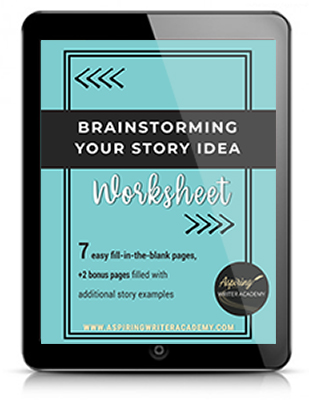
ENTER YOUR EMAIL BELOW
TO GET YOUR FREE
"Brainstorming Your Story Idea Worksheet"
7 easy fill-in-the-blank pages,
+ 2 bonus pages filled with additional story examples.
A valuable tool to develop story plots again and again.
Other Blog Posts You May Like
How to Create S.M.A.R.T. Goals to Keep Your Writing on Track
How to Find a Writing Group: Tips for New Authors
Write Your First Novel: How Do You Start?
Do You Dream of Being a Published Author? (How Bad Do You Want It?)
Who is an ‘Aspiring Writer?’ 3 Tips to Escalate Your Career No Matter What Level You Are At
How to Write the Midpoint of Your Novel (and Avoid a ‘Saggy Middle’)
20 Items to Bring to Your First Writer’s Conference
How to Find a Great Story Idea in 4 Easy Steps
How to Write a Novel While Working Full Time
The Pros and Cons of Writing Holiday Fiction (Collections & Anthologies)
Fiction Writing: How to Find a Critique Partner/Group
How to Research Information for a Historical Novel
7 Steps to Begin Writing a New Fictional Story
Fiction Writing: 5 Key Differences Between a Novel and a Novella
Fiction Writing: Office Supplies to Help You Prepare to Write Your Next Novel
3 Levels of Goal Setting for Fiction Writers

is a multi-published author, speaker, and writing coach. She writes sweet contemporary, inspirational, and historical romance and loves teaching aspiring writers how to write quality fiction. Read her inspiring story of how she published her first book and launched a successful writing career.


